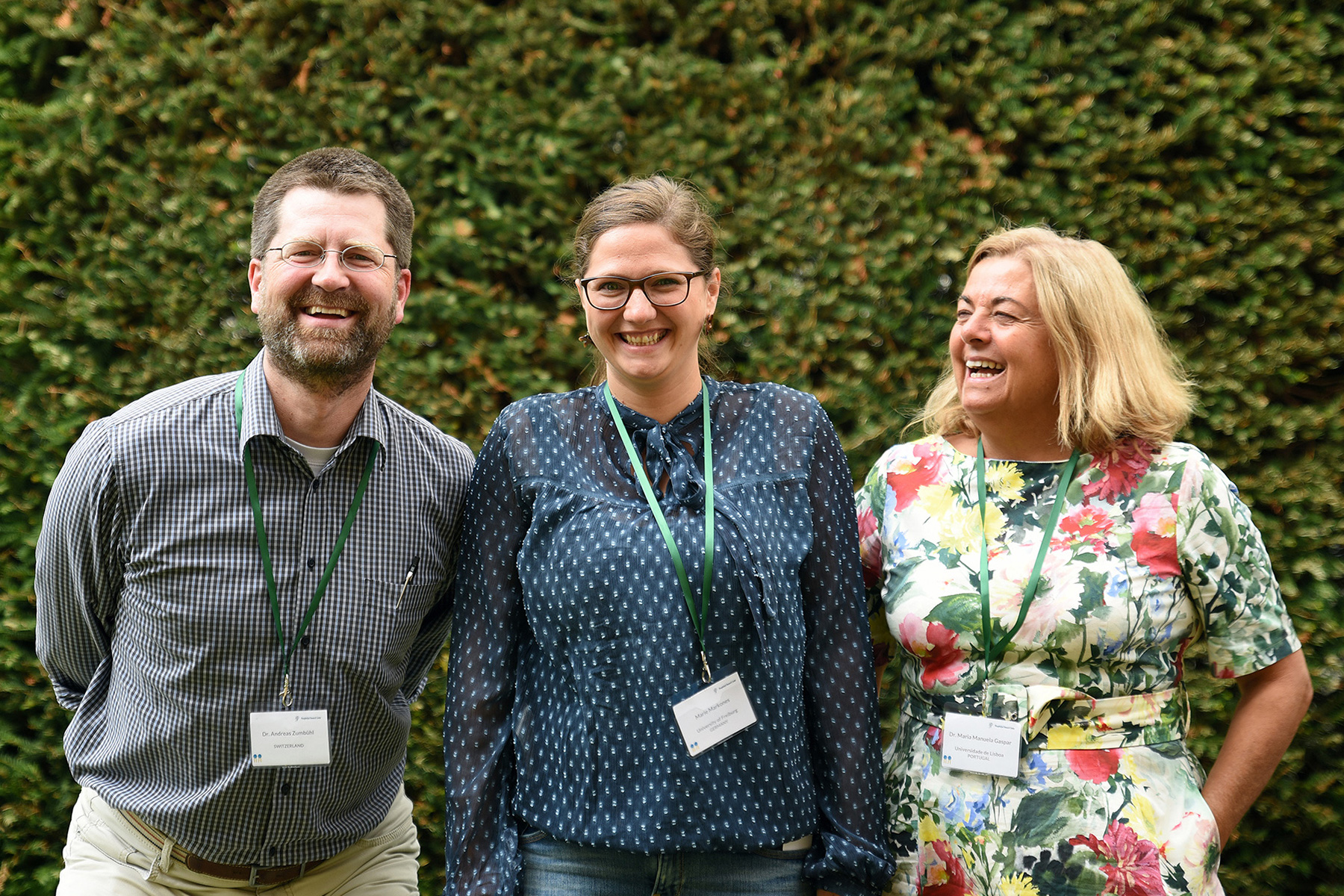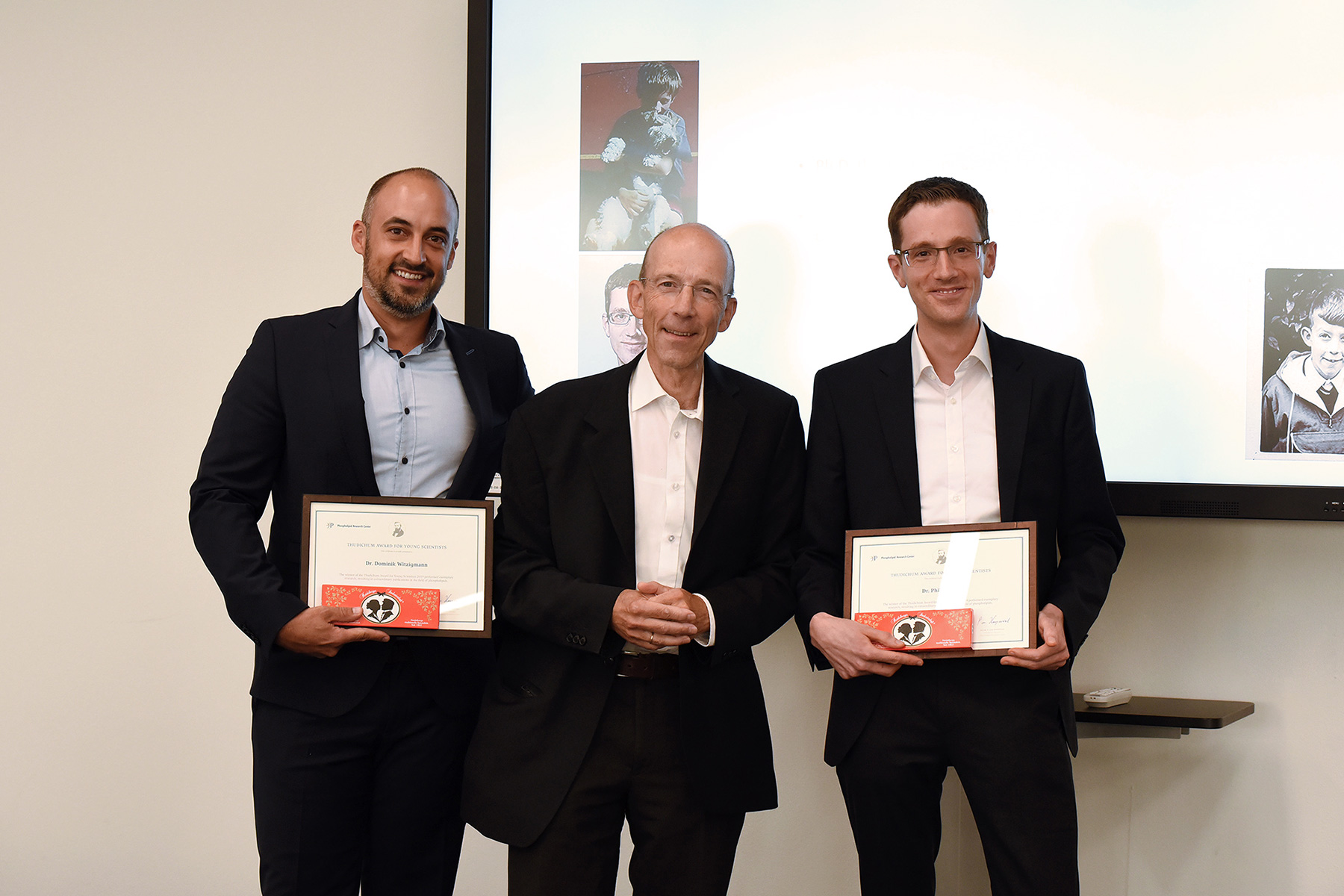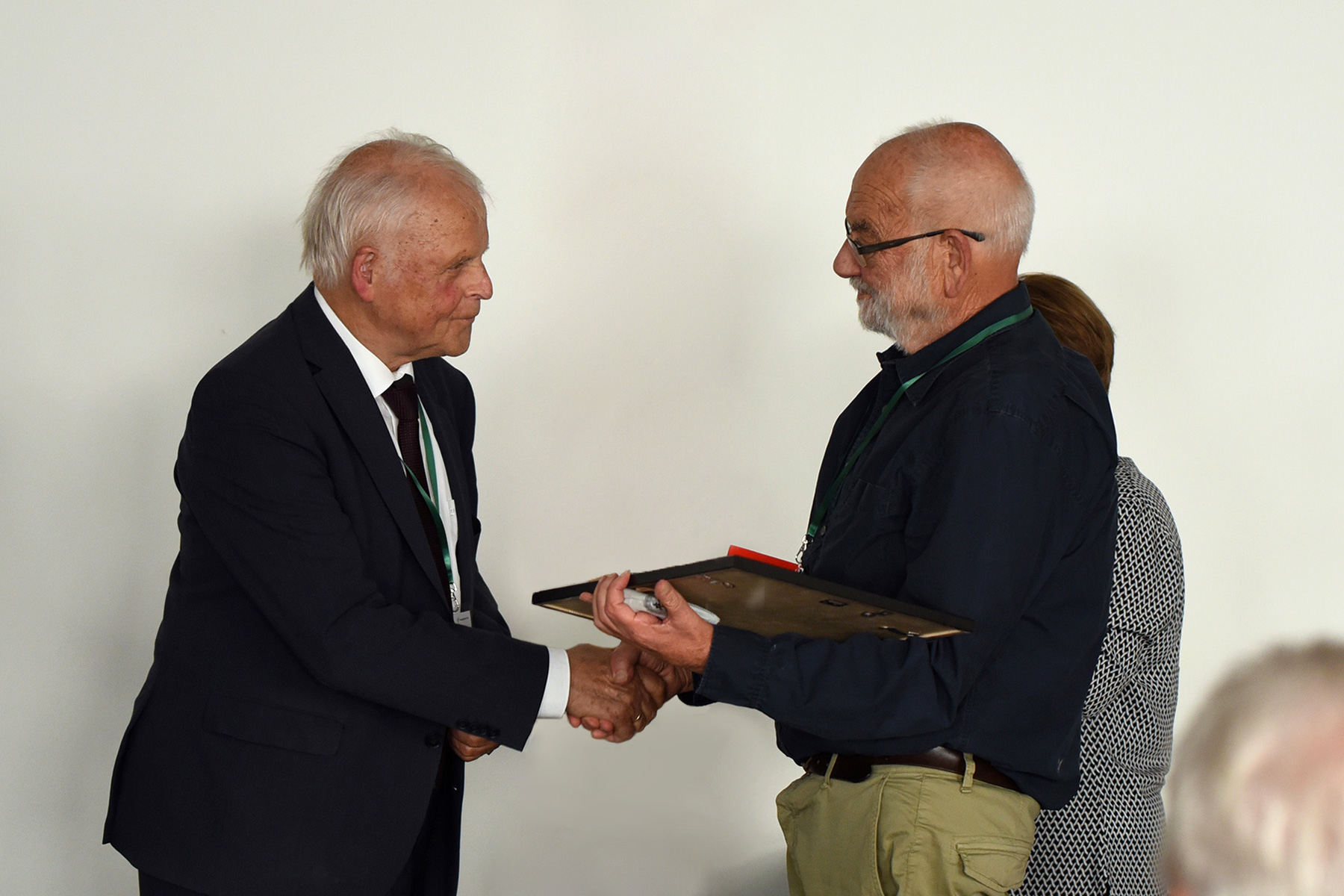6th International Symposium on Phospholipids in Pharmaceutical Research
9th – 10th September 2019 in Heidelberg, Germany
Meeting Report
Peter van Hoogevest, PhD
Phospholipid Research Center, Heidelberg, Germany
The Phospholipid Research Center Heidelberg, organized its “6th International Symposium on Phospholipids in Pharmaceutical Research” from 9th – 10th September 2019 at the Chester Hotel Conference Center in Heidelberg, Germany. 164 researchers from all over the world attended the meeting. In their seminars, international experts from academia and industry presented innovative and new applications of phospholipids, which were categorized into five topics: Introduction to Phospholipids; Advances in Oral and Topical Use of Phospholipids; Phospholipids in Industry; Special Seminar on Phospholipid Research in South Korea; and Phospholipids in Academia.
The first day started with a general introduction to phospholipids. Prof. Alfred Blume (University Halle (Saale) Germany), President of the Phospholipid Research Center, highlighted the physicochemical properties of phospholipids. Prof. Gerald Brezesinski (Max-Planck-Institute of Colloids and Interfaces, Potsdam, Germany) discussed the use of modern analytical methods such as GIXD (grazing incidence x-ray diffraction) and TRXF (total-reflection x-ray fluorescence) to study structures in (phospho)lipid monolayers and their interaction with ions.
In the subsequent section on “Advances in Oral and Topical Use of Phospholipids,” Prof. Paola Luciani (University Bern, Switzerland) showed new avenues for the diagnosis and treatment of liver fibrosis. Her research team used a human immortalized hepatic stellate cell (HSC) line with an in vitro model for studying the progression of liver fibrosis and the positive effect of soybean lecithin on liver fibrosis. This research is an excellent example demonstrating that phospholipids can be used as technical and bioactive excipients. The next seminar on “Phospholipid-Based Tablets: A New Dimension to Formulation of Antimalarials” was held by Prof. Athony Attama (University of Nigeria, Nsukka/Nigeria). He discussed the use of lipid matrices as solidified reverse micellar solutions containing PHOSPHOLIPON® 90 H, which was prepared by fusion for the antimalarial compounds artemether and lumefantrine. The seminar showed that the combination of excellent science and straightforward preparation methods results in valuable formulation concepts; Attama also addressed the situation in Africa and the need to use these types methods there. In the final seminar of this section, PD Dr. Dominique Lunter (University Tübingen, Germany) gave an interesting review on the use of phospholipid in dermal formulations which focused on the potential of phospholipids to replace synthetic emulsifiers in dermal preparations.
In the afternoon section on “Phospholipids in Industry,” representatives of the pharmaceutical industry gave presentations on their R&D work with phospholipids. The first speaker, Dr. Christian Klose (Lipotype GmbH, Dresden, Germany), explained the use of “shotgun lipidomics” for analyzing the lipid profile of the skin and how it can be used as a tool to assess the baseline of lipid composition (and its biological variability); he also discussed the effects of lipid-based formulations on the skin for cosmetics and dermatological applications. In the second presentation, Dr. Hannah Han (Heron Therapeutics Inc., San Diego/USA) informed the attendees about the development activities of a parenteral emulsion with egg PC as emulsifier for the lipophilic aprepitant (antiemetic) drug CINVANTI® Injectable Emulsion. This medication is an excellent example of how emulsions with egg PC can be used in solubilizing formulations as a biocompatible, non-toxic emulsifier so that the use of synthetic detergents as solubilizers can be avoided. Dr. Gerard Jensen (Gilead Sciences Inc., Foster City, USA) reviewed his experiences from Gilead’s clinical and commercial use of liposomal therapeutics with a focus on carrier vehicle toxicity. He discussed the examples of the commercial products AmBisome® and DaunoXome®, as well as clinical lipid systems, including those for simple solubilization of poorly water-soluble compounds.
The scientific part of the first day was concluded with a seminar given by Ass. Prof. Jun-Pil Jee (Chosun University, Gwangju, Rep. of Korea) on “Phospholipids: The Versatile Component in Development of Drug Delivery Systems.” His research area comprises his interests to use polyethyleneglycol-phospholipids for solubilization of hydrophobic drugs and to increase the stability of such systems in the blood by exploring ABC triblock fluorous copolymer based on PEG-1,2-distearoyl-sn-glycero-3-phosphoethanolamine (DSPE). The first day finished off with a conference dinner for the participants, which was held at the Schwetzingen Palace.
At the beginning of the second day, students who had one of the six pre-nominated posters out of the 62 posters presented to the Scientific Advisory Council were invited to give a short 10 min presentation about their research as part of the ″Young Session″ chaired by Prof. Dr. Christel Müller-Goymann (University of Braunschweig, Germany). Later in the day, three of students were selected as the Poster Award winners.
The day continued with a section on “Phospholipids in Academia.” The first speaker was Dr. Gero Leneweit (Carl Gustav Carus Institute, Niefern-Öschelbronn,Germany). His interesting research is focusing on the exploration of a novel industrial production method for asymmetric liposomes with high encapsulation efficiencies especially for macromolecular drugs (e.g. proteins and nucleotides), by means of centrifugation of nano-emulsions. Prof. Elias Fattal (University Paris Sud, Châtenay-Malabry, France) subsequently showed two impressive examples of his research: the physicochemical and biopharmaceutical properties of nanoparticles with dexamethasone palmitate and DSPE-PEG2000, and siRNA against luciferase loaded in neutral liposomes after complexation with protamine and coupling of an aptamer against CD44 to DSPE-PEG2000. An inspiring presentation was given by Prof. Avi Schroeder (Technion Research and Development Foundation Ltd., Haifa, Israel). He discussed the use of ‘barcoded liposomes’ that target sites of cancer where they perform a programmed therapeutic task. He specifically addressed how liposomes can be used to diagnose the tumor and metastasis for their sensitivity to different medications, providing information on patient-specific drug activity, which can be used to improve their medication.
After the lunch and coffee break, Prof. Heiko Heerklotz (Albert Ludwigs University, Freiburg i. Br., Germany) presented his detailed physicochemical research on the release mechanism and the influence of phospholipids on the release characteristics of thermosensitive liposomes. The final speech was dedicated to “What Theoretical Modelling Tells Us About the Mechanical Stability of Lipid Membranes in the Presence of Drug Molecules.” Originally the presentation should have been given by Prof. Sylvio May (North Dakota State University, Fargo, USA), but he was unexpectedly unable to attend the symposium. His PhD student Rachel Downing was an excellent replacement. She showed that their mathematical model predicts stability guidelines for inserting drug molecules into lipid bilayers: membranes with larger head-groups are more suitable for more hydrophobic drugs that penetrate deeper into the hydrocarbon core.
Poster Award 2019
Most of the projects funded by the Phospholipid Research Center were represented during the event. The Scientific Advisory Council selected the following three posters as the winners and they were each awarded a € 500 prize:
- Near-Infrared Light Triggered-Release in Deep Brain Regions Using Ultra-Photosensitive Nanovesicles, Hejian Xiong, Xiuying Li, Peiyuan Kang, John Perish, Frederik Neuhaus, Andreas Zumbühl, Zhenpeng Qin.
- Liposomes as Drug Delivery Systems for the Treatment of Infectious Diseases, Maria Manuela Gaspar, Maria Eugénia M. Cruz.
- Stairway to Asymmetry: 5-Step Approach to Asymmetric Proteoliposomes, Maria Markones, A. Fippel, M. Kaiser, C. Drechsler, C. Hunte, H. Heerklotz.
Prof. Andreas Zumbühl (National Centre of Competence in Research in Chemical Biology, Geneva, Switzerland and Acthera Therapeutics Ltd., Basel, Switzerland) on behalf of Mr. Hejian Xiong (Departments of Mechanical Engineering and Bioengineering, University of Texas at Dallas, USA), Ms. Maria Markones (Albert Ludwigs University, Freiburg i. Br., Germany), and Dr Manuela Gaspar (Universidade de Lisboa, Research Institute for Medicines (iMed.U, Lisboa), Faculty of Pharmacy, Lisbon, Portugal), were the three winners (Fig. 1) and received the Poster Award from Prof. Christel Müller-Goymann, Vice-President of the Phospholipid Research Center.

Fig. 1 The Poster Award Winners of the Sixth International Symposium on Phospholipids in Research. From left to right: Andreas Zumbühl, Maria Markones, and Manuela Gaspar.
Thudichum Young Scientist Award
The symposium concluded with a ceremonious announcement of the 2019 Thudichum-Award winners. The Phospholipid Research Center confers the ″Thudichum Award for Young Scientists” for their excellent publications on phospholipid research and the Life Award for a reputed scientist to honor his/her lifelong achievements in phospholipid research. The award is named after the famous German/English physician and biochemist Johann Ludwig Wilhelm Thudichum (1829-1901), who isolated and characterized numerous compounds of the brain for the first time, including phospholipids and related species. He recognized the physiological importance of phospholipids.
This year, the members of the scientific committee awarded the Thudichum Young Scientist Award to two researchers. Dr. Philipp Uhl (Heidelberg University Hospital, Heidelberg, Germany) was honored for his outstanding publications on pharmaceutical phospholipid research related to cell penetrating liposomes enabling oral delivery of peptide drugs. Dr. Dominik Witzigmann (NanoMedicines Research Group, UBC Vancouver, Canada) received the award for his outstanding publications on pharmaceutical phospholipid research related to the zebrafish model for assessing the body distribution of nanoparticles and RNA delivery by means of lipidic particles. Each winner received € 2,500 for their achievements, and the award was presented by the first winner of the Thudichum Life Award in 2017, Prof. Daan Crommelin (Utrecht University, The Netherlands) (Fig. 2).

Fig. 2 The Winners of Thudichum Young Scientist Award of the Sixth International Symposium on Phospholipids in Research: Dr. Dominik Witzigmann (L) and Dr. Philipp Uhl (R) with Prof. Daan Crommelin.
Thudichum Life Award
The ″Thudichum Life Award″ was awarded for the second time. Dr. Herbert Rebmann (Honorary President of the Phospholipid Research Center) congratulated Prof. Yechezkel (Chezy) Barenholz for his lifelong outstanding achievements in the field of phospholipid research (Fig. 3).

Fig. 3 Prof. Dr. Yechezkel (Chezy) Barenholz, (R) winner of Thudichum Life Award of the Sixth International Symposium on Phospholipids in Research was congratulated by Dr. Herbert Rebmann (L), Honorary President of the Phospholipid Research Center.
Prof. Barenholz is famous for the development of one of the first liposome products with targeted drug delivery properties, (Doxil®). In addition, he has an outstanding record of accomplishments in the fields of biophysics and biochemistry, in particular with the analysis, synthesis etc. of phospholipids and related dosage forms. He has set an example for future generations of phospholipid researchers.
Jury
The jury for the Life Award consists of members from the Scientific Advisory Council and the Board of the PRC; the jury for the Young Scientist Award consists of members from the Scientific Advisory Council.
The Board
Prof. Alfred Blume
Prof. Christel Müller-Goymann
PD Dr. Peter van Hoogevest
Scientific Advisory Council 2019
Prof. Alfred Blume
Prof. Gert Fricker
Prof. Andreas Koeberle
Prof. Judith Kuntsche
Prof. Paola Luciani
Dr. Frank Martin
Prof. Christel Müller-Goymann
Dr. Ralf-Olaf Quinkert
Prof. Gert Storm
Congratulations to Prof. Dr. Chezy Barenholz, Dr. Philpp Uhl, and Dr. Dominik Witzigmann for their excellent scientific research!
Conclusion and thanks
The success of the Sixth International Symposium on Phospholipids in Pharmaceutical Research in 2019 was based on the many creative minds and inspiring scientists who demonstrated the numerous versatile applications of phospholipids in pharmaceutical research and development. In particular, the author would like to acknowledge the speakers, poster authors, chairmen, scientific advisory council and the Heidelberg University (students of Prof. Gert Fricker) for their support. Special thanks go to Ms. Britta Merz, Dr. Dorothea Gutekunst, and Ms. Ina von Jeinsen for their contributions to the outstanding organization and coordination of the symposium. Finally, we would also thank all participants for their enthusiastic contributions!

